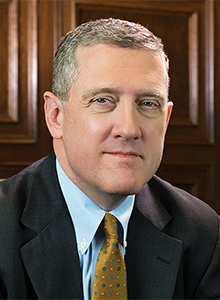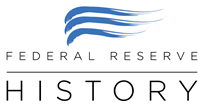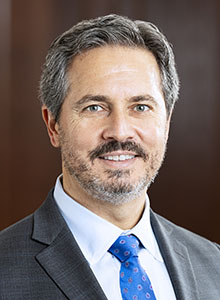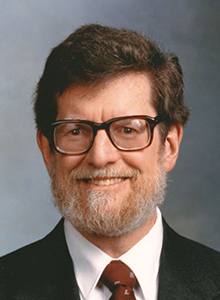
James Bullard
- President, Federal Reserve Bank of St. Louis, 2008 – 2023
James Bullard became the twelfth president of the Federal Reserve Bank of St. Louis on April 1, 2008, succeeding William Poole.
Bullard is a native of Forest Lake, Minnesota. He received a bachelor's degree in quantitative methods/information systems and economics from St. Cloud State University in 1984 and a doctorate in economics from Indiana University in 1990. Prior to becoming president, he was vice president and deputy director of research for monetary analysis at the St. Louis Fed. He joined the research division in 1990 as an economist.
Bullard's research has appeared in numerous professional journals, including the American Economic Review, Journal of Monetary Economics, Macroeconomic Dynamics, and the Journal of Money, Credit, and Banking. He is also a co-editor of the Journal of Economic Dynamics and Control and a peer reviewer for more than two dozen periodicals and institutions. In addition, he has participated in over 150 conferences, symposia and lectures around the world.
Bullard called for the Federal Open Market Committee to adopt state-contingent policy, which is policy based on the state of the economy, and to give greater consideration to headline inflation than core inflation when making policy decisions. He discussed these reasons in his paper "Measuring Inflation: The Core is Rotten" published in 2011 in the Federal Reserve Bank of St. Louis Review. In the wake of the financial crisis and Great Recession of 2007-09, he supported quantitative easing and warned of the possibility the United States might fall into a Japanese-style deflationary trap; this was the subject of his paper, "Seven Faces of 'The Peril'," published in 2010 in the Review. Bullard argued it may not be prudent to rely on a near-zero policy rate alone to ward off a deflationary outcome; he recommended current interest rate policy be supplemented with additional quantitative easing.
In early 2010, before the passage of the Dodd-Frank Wall Street Reform and Consumer Protection Act of 2010, Bullard publicly supported Federal Reserve independence and cautioned against any changes that would politicize the Fed. He has also argued that "the Fed should remain involved with community bank regulation so that it has a view of the entire financial landscape." Bullard further said that the Federal Reserve is a "well-designed" central bank because it keeps monetary policy decisions away from partisan politics while remaining part of the democratic process, including audits by several entities.
Bullard is an honorary professor of economics at Washington University in St. Louis, where he also serves on the advisory councils of the economics department and the Olin Business School's Center for Finance and Accounting Research. He has been a member of the University of Missouri–St. Louis Chancellor's Council and serves on the boards of the St. Louis Regional Chamber and the United Way of Greater St. Louis.
Bullard stepped down as president and chief executive officer of the Federal Reserve Bank of St. Louis in July 2023.
Written by the Federal Reserve Bank of St. Louis and updated April 2, 2024. See disclaimer and update policy.



 X
X  facebook
facebook
 email
email